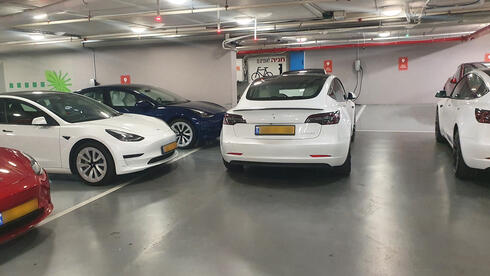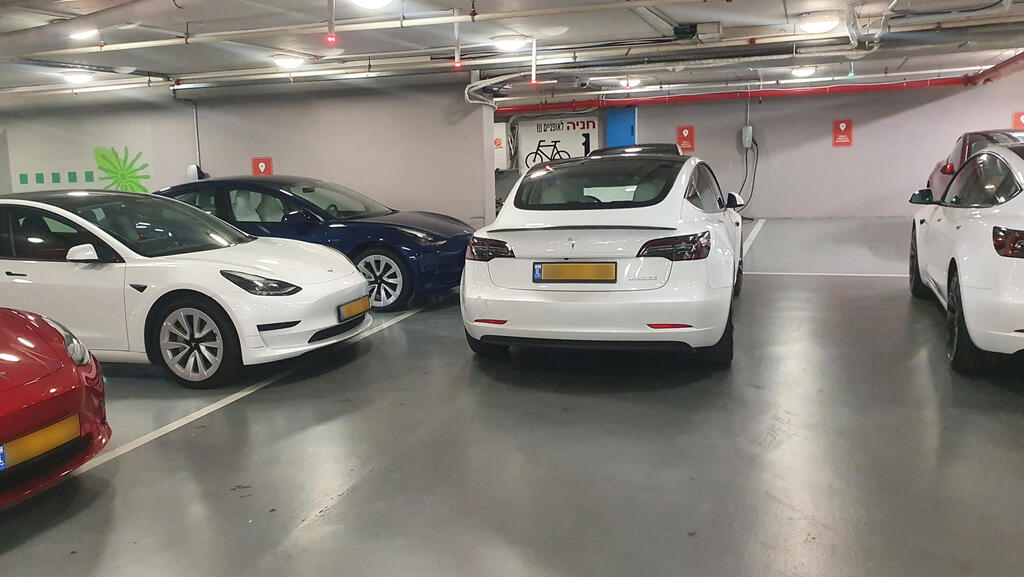
A car fire you can’t put out: The lithium battery risk no one wants to tackle
As fire crews warn of EV combustion challenges, Israel’s importers are running out of places to hide their excess stock.
"The electric car's engine flew a kilometer away," claimed one eyewitness following an Iranian missile strike on Haifa’s Neve Sha’anan neighborhood last week. Others said it was actually the car’s battery that was propelled through the air. Either way, the underlying message spread quickly: electric vehicles are dangerous - they catch fire and explode.
Amid the chaos, reports surfaced that Haifa Mayor Yona Yahav had requested an emergency order to shut down a lot near the port where EVs are stored, citing the risk of explosion. Yahav is certainly aware that thousands more electric vehicles are also stockpiled in the neighboring city of Nesher, but technically, that’s outside Haifa’s jurisdiction.
Did an EV engine really fly a full kilometer? Probably not. In fact, under missile impact, a gasoline-powered car’s engine might behave the same way.
But Yahav does appear to grasp the fire risk posed by EVs. Last Sunday, Israel’s Shipping Authority issued a warning to car importers storing vehicles in ports: “Preparations must be made immediately to evacuate vehicles with lithium batteries from the ports. An official ban is expected soon.”
What are vehicles with lithium batteries? Ironically, almost all of them. The lithium-ion battery, also found in drills, toys, walkie-talkies, and nearly every hybrid or electric car, is popular for its efficiency. Hours after the warning, the Transport and Logistics Authority issued a formal order: "Indirect delivery of vehicles containing lithium batteries will not be permitted." In other words, vehicles can no longer be unloaded into port lots; they must be trucked out immediately. And yet, no official evacuation order had followed, so the cars remained in place.
Though the fighting with Iran has ceased for now and the economy is resuming activity, the lithium-ion battery issue is unlikely to fade. The war offered Israel a sobering wake-up call about the fire risk these batteries pose - particularly in large, dense storage areas.
A Firefighter’s Nightmare
Lithium battery fires aren’t necessarily more common than gasoline fires, but they are far harder to control. During the war, all types of vehicles caught fire and were extinguished. But EV battery combustion introduces a new level of complexity.
In gasoline cars, fires typically stem from burning plastic or flammable fluids like fuel or oil. These are extinguishable with water and foam. In EVs, the lithium battery itself becomes the source. If punctured (by, say, shrapnel), lithium reacts with oxygen in a phenomenon known as thermal runaway - a chemical chain reaction that self-feeds and burns at extreme temperatures. Standard firefighting techniques don’t work. Special methods like smothering blankets or chemical suppression systems are required.
Fires can be extinguished, but scale matters. One or two EV fires might be manageable. But dozens at once? That’s a different story. Online videos show EVs burning for 24 hours, reigniting even after submersion in water. It’s a firefighter’s worst-case scenario.
The first to recognize this risk were maritime insurers and shipping companies. Transporting hundreds of EVs across oceans is a serious hazard. A battery fire at sea can quickly turn a ship into a deadly inferno.
Israeli fire officials have also warned of the structural risk. In an interview with Calcalist, they said a fire in a residential parking garage involving EVs could cause a building to collapse. Now, think shopping malls packed with hundreds of electric vehicles, some parked in tight, unventilated spaces.
As Calcalist previously reported, car importers in Israel are sitting on excess EV inventory. These vehicles, electric and plug-in hybrids, are stored across the country: in ports, in rented fields, in parking lots, and even crammed into shopping malls. In one case, hundreds of EVs were stored inside a busy mall parking structure.
Israel escaped the recent missile attacks with what now looks like luck. International protocols suggest that a burning EV should be isolated, covered, and moved outdoors. That works on a quiet LA street, not on the third floor of a mall in Ra’anana.
Still, it's important not to sensationalize. EVs are not ticking time bombs. Statistically, gasoline cars are more prone to fires. They have exposed fuel lines, hot engine blocks, and flammable fluids. An EV needs significant external damage, like battery puncturing, to ignite.
But the risk doesn’t disappear. The ceasefire may be holding, but tens of thousands of EVs remain stored near Israeli cities. If a battery shorts, or a fire starts during charging or transport, what happens when one EV fire spreads to hundreds? What happens if it happens inside a mall?
Right now, there is no answer.














